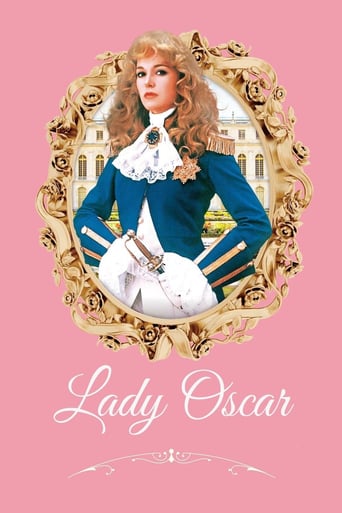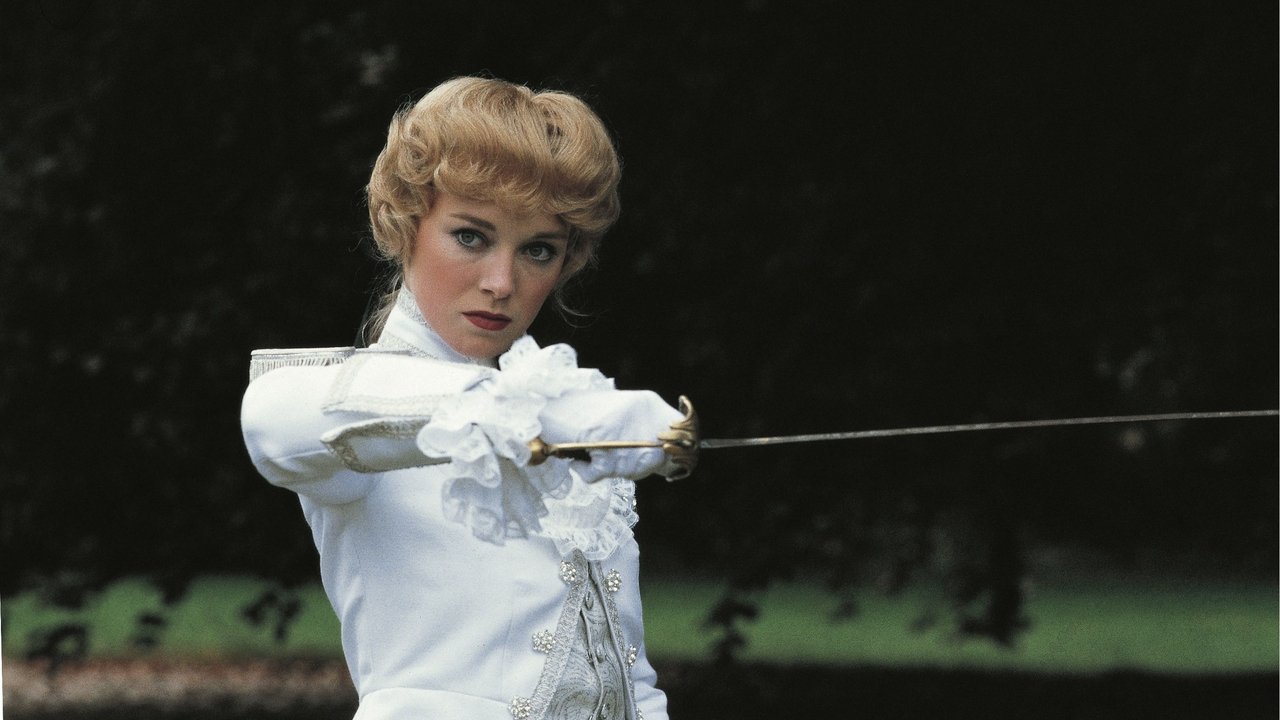ralfie840
Actually,to correct what another reviewer said(wanting also to correct a supposed error,but making a mistake),the anime "Lady Oscar(Rose of Versailles)" came AFTER the movie(that means almost an year after the movie was made) and WAS ALSO TARGETED TOWARDS THE CHILDREN.So,the movie is based ONLY upon the manga and NOT AT ALL upon the anime.Also,the "historical clichés" aren't "cliches",but REAL HISTORICAL FACTS and I really don't see why the movie shouldn't present them,like the manga did,too. To talk about the movie,as a Lady Oscar's fan,I would consider it somehow average.It has some good-or even very good-parts(the costumes,the sets,the music,some aspects of the play of some characters-I disagree with someone who said that the acting is "incredibly weak all around",because it's clearly not like that!) and some more bad parts(the way in which most of the characters were presented,different from the ones in the original story,the fact that some important events in the story aren't showed at all,the play of some actors,the ending which is an almost complete nonsense).But,in the end,it's,like I said,it's an average movie,though enough fans are,quite rightfully,disappointed of it.
Oscar Mini
I'm a crazy fan of Rose of Versailles manga for a long long time, and I watch anime version, some scene of Takazakura version, a rock musical version in Italia. All of them are really close to the original one, but when I watch this live action, I cannot believe it belongs to Hollywood =='Totally holly crap, it destroy the characters of Riyoko Ikeda sensei. Especially Oscar, my idol, with girly outfit that I have no idea how she can survive in the army like that. They should choose another actress who look more like man and have strong personality. Moreover, Oscar's characteristic is broken 100% in this live action. When her father slapped her for disobeying the royal order, she slapped him back. OMG how a daughter can do this to her own father, even if he is doing the wrong thing??????????? Besides that, the scene with Andre in 12h July 1789 is unacceptable, and the worst thing is that : Oscar doesn't lead French people to attack Bastile Prison like manga, how pity !!! The ending is Andre comes out to see the revolution then he is shot and die????? Next thing is Oscar searches for him in the crowd without knowing that he is death???????????????? I just like what sh*t I just watch and I am really gonna angry for the description of this movie =='Really disappointed for a Hollywood production and it deserves a Golden Raspberry Awards :| Cannot understand why it has rate of 6.3 :|
MARIO GAUCI
As had been the case with Christian-Jaque's THE BLACK TULIP (1964), this is another French swashbuckler whom I first became aware of via the Japanese animated series I used to catch on Italian TV as a kid. Conversely, the film version of LADY Oscar proved to be more satisfying than that of THE BLACK TULIP, which is surprising given that the former is a maligned film within its distinguished director's canon. Having said that, along with his modernistic remake of Jean Cocteau's OPRHEE' (1950) entitled PARKING (1985), LADY Oscar had always been the one title I was most eager to catch from Demy's lean and near-invisible post-1973 period. It is ironic therefore that I have managed that feat before having acquainted myself with Demy's best-known and finest achievements of the early 1960s which is all the more remarkable when one considers that LADY Oscar was a bastard international production: a Franco-Japanese joint venture shot in English with a cast of equally mixed nationalities and whose tangled worldwide distribution rights have made it impossible for even the British Film Institute to secure a screening in their renowned National Film Theatre in London for a 'complete' Jacques Demy retrospective in November 2007! Therefore, all the more power to Yamato Video, the Italian DVD production company who specializes in releasing vintage Japanese anime series (that were all the rage on Italian TV as I was growing up in the 1980s and early 1990s) for succeeding where others have failed; a gallery of trailers from their catalogue is available as a supplement on the LADY Oscar disc and watching it was "a blast from the past" for me as the saying goes! Anyhow, back to the film at hand: the fairy-tale qualities of the historical narrative are ideal hunting grounds for Demy, who had already brought DONKEY SKIN (1970) and THE PIED PIPER (1972) to the screen although, in this case, he drew inspiration from a Japanese comic strip rather than a local legend (albeit set in his native land). Needless to say, the film is a feast for the eyes when it comes to sets (some of the exteriors were actually shot on the Versailles Palace grounds) and costumes but, even if the work of Demy here seems not be counted among his finest achievements, a couple of elegantly sweeping camera movements (the clandestine meeting in the abandoned château between Queen Marie Antoinette and her Swedish lover) and well-mounted sequences (the vigorous fist-fight in the tavern) are certainly noteworthy; the same applies to the musical contribution of Demy's regular composer Michel Legrand. If there are distinct flaws, it's that the film moves at rather too deliberate a pace (with a running time of just over two hours) and has a needlessly unhappy ending.In spite of the title, the narrative incorporates three parallel story lines that give a more sweeping picture of the tumultuous times it depicts (starting out in 1755 with the birth of Oscar and culminating in the storming of the Bastille that led directly to the French Revolution of 1789): Oscar's father had long wanted a male heir to follow him into his military career and when his wife dies in giving birth to yet another female, he determines to make a man of his newborn child regardless; while Oscar is eventually recruited as personal guard to Marie Antoinette, we follow the amorous exploits of the latter as well as the rise of one female peasant into aristocracy through devious schemes and callous behavior to her true peers (perhaps in emulation of the notorious Madame Dubarry whose name is mentioned at one point). In view of its origins as light-hearted kiddie fare, there is a surprisingly subversive undercurrent of sexual ambiguity in Oscar's imposed masculinity (and the fact that this starts a cross-dressing fad among the upper classes), the repressed feelings for her shown by the stable boy she grew up with, the full-blown kiss on the lips Oscar gives during her own supposed engagement party to a giggling young lady she's dancing with, etc.Catriona MacColl looks just ravishing in the title role, both when dressed in her military outfit and also when she occasionally gives in to her womanhood (including a brief topless bit); this was her first film and arguably her best role since only another appearance for Demy and three in Lucio Fulci horror films including CITY OF THE LIVING DEAD (1980) for which she even recorded an exclusive audio commentary for its R2 DVD! really stick out from the rest of her filmography. Another beguiling presence in the film is undoubtedly that of Christine Bohm who plays Marie Antoinette; unlike MacColl (despite their being the same age), LADY Oscar proved to be her last film as she tragically died at 25 in an accident that same year. As for the male cast, the most prominent are Barry Stokes (as Oscar's stable boy companion and true love) and Martin Potter (as her jaded, titled but short-lived fiancé); incidentally, while they both had their artistic triumphs for major directors in Juan Antonio Bardem's THE CORRUPTION OF CHRIS MILLER (1973) and Federico Fellini's FELLINI - SATYRICON (1969) they each also worked for cultish British exploitation film-maker Norman J. Warren in, respectively, PREY (1978) and SATAN'S SLAVE (1976)!! P.S. My amiably lazy feline pet goes by the name of "Lady Oscar": I had originally dubbed it Oskar in tribute to one of my favorite foreign films THE TIN DRUM (1979) because, like its protagonist, my cat seems to have stopped growing of its own accord (while that of my aunt, which is of a similar breed and only a year or so older, has become quite huge!); my mother, unaware of this connection, insists on calling her "Lady" because, first of all, it's a female and, frankly, really does act royally and has the genuine impression that we're there to wait on it!!
tedg
The sad truth is that Jaques Demy is a horrible filmmaker. The much celebrated "Umbrella's of Cherbourg" was dreadful. Absolutely dreadful, but pretty in a stagy way. There isn't much you can say when you encounter something pretty but hollow. Of course it happens all the time to me, that I find movies with no soul. like girls trained to be empty.But there is something notable when something is so very pretty as this is, and so very empty at the same time. The provenance of this is at least interesting: a Japanese comic book. And if you wish to sit through it, you'll see copious references to "Barry Lyndon," on which this is clearly modeled. Now the magic of that was its carefully spaced vacuums. It had engineered emptiness, something that only a master could do.This. This is just empty.Ted's Evaluation -- 1 of 3: You can find something better to do with this part of your life.


 AD
AD




